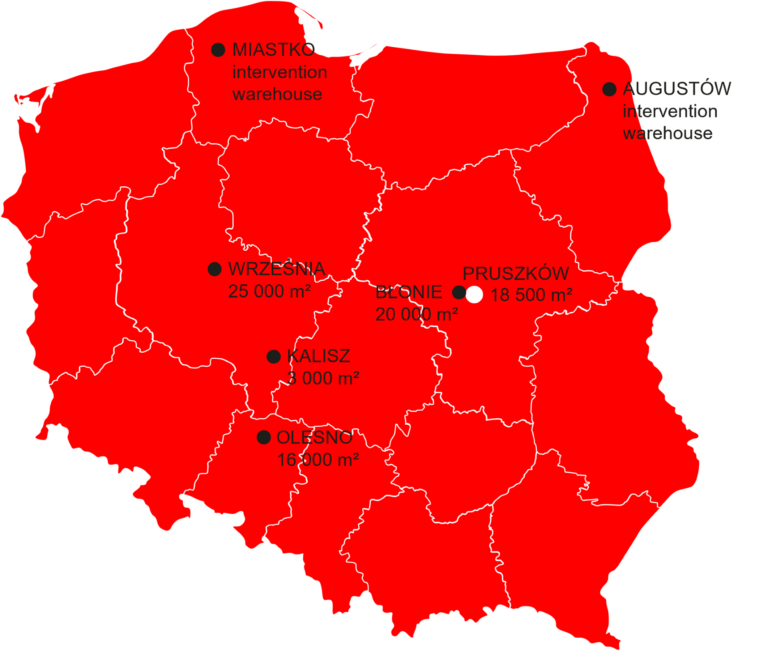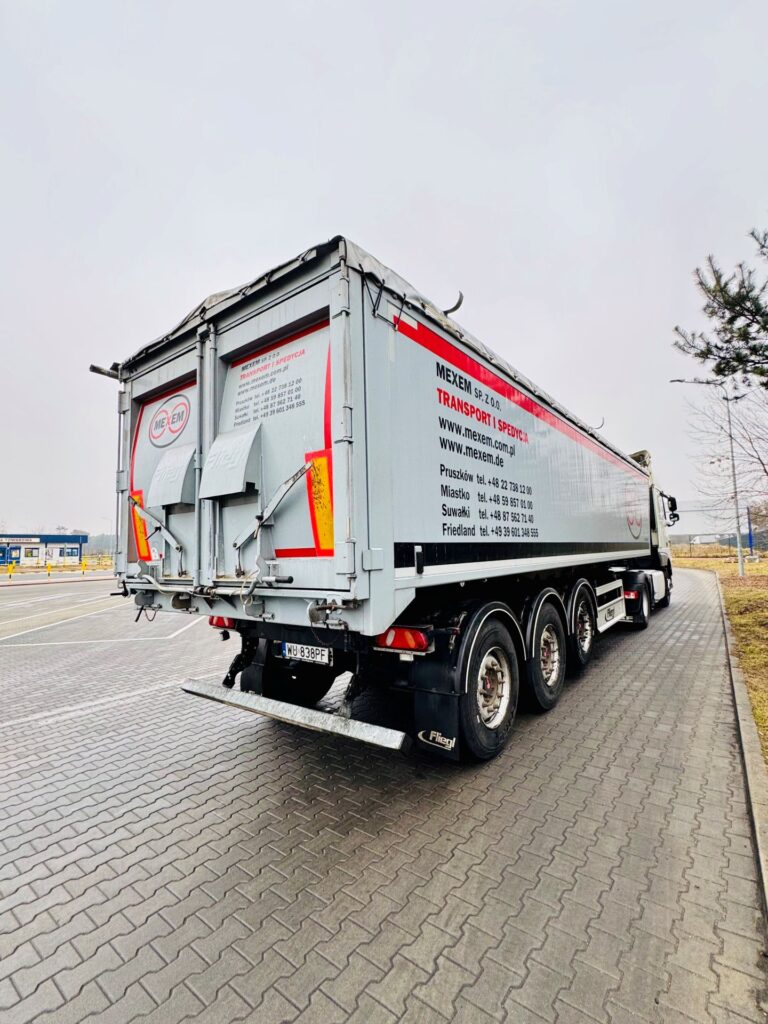
Domestic transport
Experienced drivers and extensive fleet
The fleet we use for domestic transport is as follows:
-
more than 100 own vehicles
-
more than 450 vehicles of direct subcontractors
-
capacity: up to 114m3
-
tonnage: up to 28 tonnes
The trucks driving in the MEXEM fleet are adapted to carry out various types of transport. Here are the types of vehicles we have at our disposal:
-
standard trailers (24-25t payload), including walking-floors and double decks,
-
refrigerated trailers (load capacity 22-23t)
-
mega-trailers (load volume up to 100m3)
-
large volume sets (jumbo)
-
silos (27t payload, 60,000 litres capacity)
-
tippers (load capacity 28t, up to 37m3)
-
container chassis (27.5t payload)
-
intermodal semi-trailers (25t payload)
-
vehicles for 22 pallets (load capacity up to 14.7t)
As a socially responsible company, we are committed to environmental sustainability. All of MEXEM's domestic transport vehicles comply with the strict EURO6 exhaust gas standard, and we ensure that our subcontractor vehicles also meet the latest clean exhaust gas standards.
By choosing MEXEM for domestic transport, you can be confident in the safety of your cargo, as our experienced drivers ensure that it reaches its destination on time and in a secure manner. We employ only the best drivers on the market, applying very strict criteria in the selection of both subcontractors and our own drivers. We can therefore state with full responsibility that your cargo is in good hands.
Insurance and monitoring of transport
All domestic transport services are covered by full third-party liability insurance, with a value of up to €500,000. Additionally, there is the option to insure every transport with a Cargo policy. For your safety and peace of mind, all MEXEM vehicles and the vast majority of our subcontractors are equipped with GPS transmitters, providing real-time information on the whereabouts of your cargo.
Transport within Poland is governed by the provisions of the Transport Law.
Domestic freight transport - characteristics of freight transport in the nationwide market
The international and domestic transport markets are each governed by their own unique set of regulations. In Poland, hauliers must provide transport services while taking into account geographical considerations, current regulations, and the specifics of the local market. This necessitates the anticipation of potential issues, such as loading, transport of shipments, and delivery to the final recipient. The domestic transport market is characterised by several factors, including:
-
the short transport time for goods, which generally takes place within several hours, given the geographical extent of our country,
-
the provision of transport services using virtually only land-based transport channels, which run primarily on east-west and north-south routes,
-
implementing solutions identical to intermodal transport using containers and similar means of transporting goods,
-
no need for customs handling as long as the goods have not previously been imported from another country.
Domestic road transport throughout Poland - professional advice and support in logistical handling of shipments
As a transport business owner, you need comprehensive forwarding support and reliable fulfilment of transport orders. We provide professional advice, punctual service and support during loading and unloading, as well as customs handling. The quality of our services is second to none. We invite you to contact us to arrange the details of your cooperation. Our specialities are international and domestic transport. With over 30 years of experience in the transport sector, we are one of the leading companies in the market, enabling us to provide professional services.
If you have any questions or require assistance with transport, please do not hesitate to contact us. We are dedicated to optimising your transport processes and, if necessary, can provide support for transport within Poland, the European Union and beyond.
Our fleet
FAQ
A professional road transport quote depends on factors such as the route and its distance, the number of loading and unloading points, the weight and volume of the goods to be transported, the time and date of loading and unloading, fuel prices and toll rates, as well as the type of vehicle and the number of drivers required to handle the order. In the case of individual enquiries from day to day, prices may fluctuate due to the popularity of the route and the possibility of organising further transport orders for the vehicle used.
Above all, you will need a consignment note describing the goods (CMR for international transport) and a certificate of origin. In the case of the transport of selected categories of goods, such as perishable foodstuffs, animals or waste, for example, additional legally regulated documents will also be required. If goods are exported outside the EU, documents necessary for customs clearance such as invoices, export documents and import declarations will be required.
First and foremost, this is due to the need to assess whether the value of the carrier's liability insurance policy is high enough to fulfil the order. In the case of high-value goods and/or goods that are particularly vulnerable to damage, we recommend additional Cargo insurance.
The time required to transport a load depends on a number of factors, primarily the driver's working hours and the speed limits on the route. Drivers of vehicles with a maximum permissible weight of more than 3.5 tonnes can drive for up to 10 hours a day, and the speed limit for such vehicles in most European countries does not exceed 80 or 90 km per hour on expressways and motorways. An important factor affecting the speed of an order is the time taken to load goods, which counts towards the driver's daily working time of 13 hours as standard (and a maximum of 15 hours). It is also worth bearing in mind that there are restrictions on the movement of lorries during public holidays and holiday periods, which may additionally affect the delivery time.
Restrictions on the movement of vehicles and vehicle combinations with a maximum permissible weight of more than 12 tonnes are set out in the regulations of the Minister of Transport. They prohibit the movement of vehicles and vehicle combinations with a maximum permissible weight in excess of 12 tonnes on public roads throughout the country, on public holidays and at certain times on days preceding public holidays, as well as during most weekends during the holiday period. However, it is worth remembering that there are several exceptions to the described restrictions and, among others, they do not apply to vehicles that transport food, medicines, live animals, postal consignments, fuel or municipal waste.
https://www.gov.pl/web/infrastruktura/ograniczenia-w-ruchu
Pursuant to a decision by the Mayor of the City of Warsaw, vehicles with a permissible total weight of over 16 tonnes are prohibited from entering Warsaw from 7.00 a.m. to 10.00 a.m. and from 4.00 p.m. to 8.00 p.m. The Municipal Roads Authority issues C-16 badges for such vehicles, which, in connection with their operations, must enter Warsaw during the hours of restriction. https://zdm.waw.pl/sprawy/zezwolenia-i-identyfikatory/pojazdy-ciezarowe/identyfikatory-c-16/














